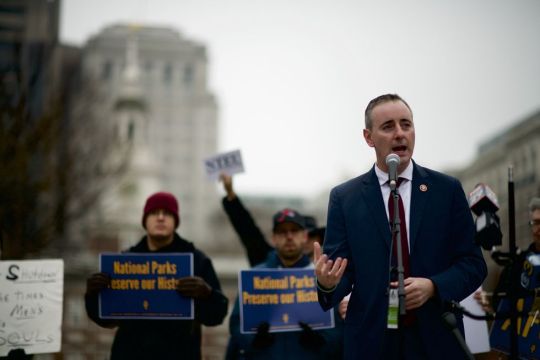#(well the house sponsor not the senate)
Text
...
#u know eric nam is rlly the best kpop (well i guess ex kpop lol) boy#/leaves kpop label for own label/ -> /immediately starts doing political campaigns/#his event in Georgia tonight lol....... (my house reps there lmao only reason i know about it..... grace meng in solidly blue ny-06 tho#...like i honestly feel like i gotta volunteer for someone who ISNT grace meng tho....cuz she wins by 30 point margins usually#cuz well..... district is predominantly white and asian but like...most white ppl in the district (incl me) r jewish#typically were the most jewish district in the country AND jews r the second most left group in the US (following black women))#personal#grace meng is really neat btw....her voting record is great AND she wrote the no luxury tax on menstrual products thing for NYS when she#was state assembly rep.....and she wrote one federal too but it hasnt passed :/#she was also the main sponsor on the antisemitic and anti asian hate crime bills during covid too#(well the house sponsor not the senate)#wheres the marge potato meme....just think she's neat.
7 notes
·
View notes
Text
I hope people in the OSC (and other fandoms in general) who are ok with or neutral about Kosa realize that not only will we lose a bunch of platforms that allow us to interact with each other (Tumblr, discord, Ao3, Wattpad, Twitter, YouTube, etc) but will also get rid of at least 80-95% of our fandom.
The OSC consists mostly of people between 13-17 who (if Kosa goes through the Senate and Houses of Representatives and gets passed as a law) will most likely no longer have access to YouTube and other social platforms which actively kills almost all the people who read and watch Object Shows!
By visiting and sharing animated shows like II or BFDI those creators make money which gives them the means to keep making their shows and paying their animators, voice actors, writers and so much more. This bill will actively get rid of most of the people who watch these shows which will cause a large loss in support and revenue for these creators and will most likely mean the end for any smaller object show.
Object show comics rely on people sharing them around in fandom spaces since they’re not animated and put on YouTube like animated object shows are. By losing these spaces and the people who support their content these creators will no longer be able to reach a large audience and get the support they need to continue their comics. This means that we will lose a lot of the comics that the OSC has!
Most of the content you see in the OSC is made by minors, which this bill will actively destroy and thus kill this fandom and many others!
So I am begging of you OSC and other communities, Please please please sign petitions, tell your senators and representatives that you don’t want this bill to pass, and tell anyone that you can reach about how this Bill is a violation of privacy and minors' rights! Re-blog anything you see with helpful information about what Kosa is and keep talking about it! We need to tell people about it so that this doesn’t go through the Senate. Remember, the final day is February 26, we don’t have that long!!!
Here’s some helpful resources:
 https://www.eff.org/deeplinks/2023/07/you-can-help-stop-these-bad-internet-bills
#kosa#stop kosa#kill kosa#kosa bill#internet censorship#kids online safety act#say no to kosa#online privacy#privacy violation#bad internet bills#down with internet censorship!!#internet freedom#stop bad internet bills#lgbtq+#transgender#queer community#osc#object shows#osc community#object show comics#object show community#inanimate insanity#bfdi#fandom spaces#ao3#wattpad
299 notes
·
View notes
Text


I was wondering how accurate this was so I did some fun googling and yall.
So starting with the fact that police in the USA were formed when Dems had Congress and Senate and the same was true when the first organized police department was founded (in Boston, btw)....

1963. Dems had Senate and Congress.
While this allowed for huge strides in civil rights police brutality still continued to be largely unaddressed.

1966. Dems had Senate and Congress.
To point out further racial oppression James Meredith starts a 270 mile walk from Memphis, TN to Jackson, MI. He's shot by a sniper the second day which causes an influx in support from allies & prominent civil rights members (such as MLK) who fly out and walk in his stead.
Governor Johnson (d) of Mississippi, who ran on a segregationist platform but changed platforms when he saw that Black people were gaining more supporters, promises to protect marchers as they pass through his state. Police then tear gas them as they were setting up tents for the night in Canton, MI (pictured). 15k show up to Jackson. It's the biggest march in MI history and more successful than Meredith had planned.
No bills were introduced that year.

1956-1979 Dems had senate & Congress.
In 1961-69 they even had a governmental trifecta with Congress, Senate, and the presidency and again in 1977-79. The director of the FBI at the time was Republican J. Edgar Hoover. Head of Intelligence was Democrat William Sullivan. Attorney General & democrat Robert F. Kennedy authorized several programs for them such as wire-tapping MLK.

1968. Dems had Senate, Congress, and presidency.
President Lyndon Johnson (Democrat president while Dems had Congress & Senate) signs the Omnibus Crime Control and Safe Streets Act of 1968, birthing the Law Enforcement Assistance Administration & granting federal funds to local governments in order to obtain military resources to quell potential riots. A direct response to the protests and riots throughout the 50's & 60's. Protecting police from protesters.
Democrats do this instead of protecting the public from police and their prejudice.

1992. Dems have both Senate and Congress.
After the verdict of the 4 police who beat Rodney King on camera is announced & they are Not indicted the public starts rioting. The national guard, fire department, and several police departments are called in by then democratic mayor Tom Brady. After the riots a separate federal trial is held and finds 2 of the 4 officers guilty. All were fired from LAPD.
The Police Brutality Accountability Act of 1991 is introduced. Only introduced.

1994. House & Senate under dem control.
They pass the Violent Crime Control and Law Enforcement Act instead. It's drafted by democrat Joe Biden and sponsored by Texas Rep Brooks (D). It's an infamously harmful bill that results in the prejudiced mass incarceration of minorities, especially Black people. This bill funded police departments instead of holding them accountable aiding their further militarization as well.

2020. Dems have both Congress & Senate.
Which brings us to recent times. Where Democrats have again pretended to support and listen to the public demands to decrease/eliminate police brutality only to turn around and insist protests are the reason they keep funding the police instead of giving us rights.
"See? You're too dangerous to Not have a militarized police force."
As if we aren't protesting because the police are already too dangerous. Like that's not what started all this.
At this point a pattern like this can only be seen as intentional. A planned out excuse for funding police again and again and again instead of Stopping police brutality. Instead of enforcing or creating ACTUAL effective reform or regulations. They just keep throwing money at police departments and saying "hey here are billions of dollars that we want you to use to be less violent racists. It's also to help you be more safe when facing the people who are protesting your racist violence. Also we aren't gonna make sure you actually become less violent or less racist but we definitely hope you don't use this all this money to get worse."
Which has backfired across decades at this point. They keep doing investigations and making committees and for what?
We've done that. We know police are racist. We know they're violent. We know they're only spending enough to say they provide 6 months (if that) of sensitivity training and spending the bulk of that money on militarization gear. So what. We know that.
Now what.
What, after 100+ years could their excuse possibly be for STILL doing the same thing. For STILL not addressing it. For STILL not passing reform despite the MANY opportunities they've had? What could police departments Possibly be doing for them?? What excuse could be good enough?
I'm glad you asked.
There isn't one. There are answers of course. Greed, power, privilege, etc. The list goes on.
But are they good enough for you? They're not for me.
I have to beg on Tumblr just for my rent to get paid or for my kid to have dinner sometimes. The success of Democrats or my "country" doesn't mean shit to me, it does nothing for me. It only does things to me. Success enables police, it increases funding, it makes them More afraid of having their ideas of success taken from them, makes them more protective of their status quo. Their success hurts me. Fuck their success.
What matters is that time and time again Democrats have insisted they'd be there for minorities and then empowered the people oppressing, killing, and suppressing us and our rights.
What matters is that time and time again they've said they're powerless and their supporters insist they just don't have a majority to do anything with or that republicans keep blocking them or-
But passing bills to harm us? That's easy. And they don't Have to keep doing that. They just keep saying they do... To protect police. And they only keep "needing" more protection for police because they refuse to give us any. We continue to express our right to protest and they continue to try intimidating us out of it.
All the rights we have? They didn't give to us. Look at those posts. We fought for them while Democrats were in charge. They didn't give us those, they didn't stand with us. They still don't. They stand with the police as they always have.

August 2022.
For hundreds of years we've dealt with this. How much longer is it gonna be. How many more generations are going to have to put up with this government trying to insist that mediocrity is the best they can do indefinitely?
And if you still refuse to hold Democrats responsible, if you still find yourself compulsively trying to point out all the ways that Republicans are worse please know this: I know.
I know you're going to say "well Democrats are our best shot"
And to that I say if this is our best fucking shot....and they're *gestures vaguely at the post* like that.... Can we agree that it points to a much wider issue. If Democrats are our best shot and they're Only this effective and they're only making the most Minimal effort possible year after year. If we Know that their hands are tied by Republicans at best and at worst theyre fascists benefitting from the exploitation of BIPOC and other marginalized communities....
Can we admit that our systems are broken. That it goes further than Republicans or Democrats being bad. That it's Everything? That even if Democrats were actually perfect that everything would still be wrong and fucked up because the system itself holds them from making any effectual change?
That the checks and balances that the founding fathers put in place to make sure that our politicians are fair and just and give a shit about the people they serve aren't working.
Because if they were why would it take HUNDREDS of years for a community to get one thing. Just stop police brutality. That's all we asked. That's it. Stop hurting everyone who isn't a white cis man. Stop killing us in broad daylight for demanding you give us rights and respect the ones we Already have.
So why are we still starting 2023 with brutality making headlines?
If a government is effective and cares and listens and it's representives Truly represent it's constituents and fight for them and it's not just about profit or greed or winning elections or keeping minorities in line then why are we still here?
Why are we still asking for the same rights as our great-great-great-great grandparents?
If that progress? Is that success?
What the fuck are we doing. Like actually. How do we throw a wrench in this system. What will it take for Democrats and liberals and You to realize that all we are doing is driving the future into the hands of fascism.
What do we do? When do we finally do something?
°•°•°•°•°•°•°
If you like my posts consider leaving a tip
#idk what i thought i was gonna find but it wasn't a pattern of behavior stretching all the way back to the founding of police in the USA#democrats#liberals#progressives#protests#human rights#yeah this is about police brutality but also ableism and classism and poverty and everything else
2K notes
·
View notes
Text
So my state passed a law that now requires laboratories and doctors offices to collect demographic information including sexual orientation and gender identity.
I usually wouldn’t have a problem with this, except that the law states that 1) this is for “the tracking of lab results and diseases within certain demographics” and 2) that it exempts hospitals and labs from having to do sensitivity training for catering to these demographics.
I wish I understood that before I filled out those papers they gave me thinking it was hospital policy, but nope they want labels on our medical records to track what illnesses were getting so they can tie it back to our identities…
…As someone who ID’s as intersex and lesbian, they’ve got to understand why I’m angry at this, or at the very least fucking suspicious of their motives
Because this feels like a “calling what we know as AIDS “GRID” (Gay Related Immune deficiency) in the 80’s until the straights started to get it too” situation, you know, the one of multiple times when the American government and the cisgendered-straight population decided it was okay to pretty much genocide the queers by refusing to offer them medical help, housing, jobs, etc. because of their status as HIV+ (or just as LGBTQ+)
And also, before you go attacking republicans this was passed by a majority democratic state senate, and was sponsored by two democrats.
It goes to prove that no state, no matter what any map says, no matter the makeup of the states legislative body, is safe for LGBTQIA+ Americans.
To add, if you live in my state and have seen this you are allowed to choose “chose not to answer” or “would not disclose” as an answer to these questions, and now that you know the government is getting this information I highly recommend that you do as such, and only disclose to providers who are safe to disclose to verbally, as well as requesting that your answers to the survey stay as “not disclosing” due to the reasons it is being collected, and who is getting that information (hit, it’s the states DOH so they can most likely start labeling conditions “gay diseases”)
#queer community#lgbtq#lgbtqia#lgbtq community#lgbtq healthcare#queer#lesbian#gay#bisexual#sapphic#transgender#transfem#transmasc#nonbinary#genderqueer#genderfluid#this could effect all of us
66 notes
·
View notes
Text
Congress’ unfounded plan to ban TikTok under the guise of protecting our data is back, this time in the form of a new bill—the “Protecting Americans from Foreign Adversary Controlled Applications Act,” H.R. 7521 — which has gained a dangerous amount of momentum in Congress. This bipartisan legislation was introduced in the House just a week ago and is expected to be sent to the Senate after a vote later this week.
A year ago, supporters of digital rights across the country successfully stopped the federal RESTRICT Act, commonly known as the “TikTok Ban” bill (it was that and a whole lot more). And now we must do the same with this bill.
As a first step, H.R. 7521 would force TikTok to find a new owner that is not based in a foreign adversarial country within the next 180 days or be banned until it does so. It would also give the President the power to designate other applications under the control of a country considered adversarial to the U.S. to be a national security threat. If deemed a national security threat, the application would be banned from app stores and web hosting services unless it cuts all ties with the foreign adversarial country within 180 days. The bill would criminalize the distribution of the application through app stores or other web services, as well as the maintenance of such an app by the company. Ultimately, the result of the bill would either be a nationwide ban on the TikTok, or a forced sale of the application to a different company.
Make no mistake—though this law starts with TikTok specifically, it could have an impact elsewhere. Tencent’s WeChat app is one of the world’s largest standalone messenger platforms, with over a billion users, and is a key vehicle for the Chinese diaspora generally. It would likely also be a target.
The bill’s sponsors have argued that the amount of private data available to and collected by the companies behind these applications — and in theory, shared with a foreign government — makes them a national security threat. But like the RESTRICT Act, this bill won’t stop this data sharing, and will instead reduce our rights online. User data will still be collected by numerous platforms—possibly even TikTok after a forced sale—and it will still be sold to data brokers who can then sell it elsewhere, just as they do now.
The only solution to this pervasive ecosystem is prohibiting the collection of our data in the first place. Ultimately, foreign adversaries will still be able to obtain our data from social media companies unless those companies are forbidden from collecting, retaining, and selling it, full stop. And to be clear, under our current data privacy laws, there are many domestic adversaries engaged in manipulative and invasive data collection as well. That’s why EFF supports such consumer data privacy legislation.
29 notes
·
View notes
Text
The bill would require the Internal Revenue Service to tax large funds that fail to sell off their single family homes over that timeframe. It already has some support in the house, where it is co-sponsored by the U.S. Representatives Nikema Williams and Linda Sánchez, as well as in the Senate, where it is cosponsored by Senator Tina Smith. Advocacy groups Private Equity Stakeholder Project, Consumer Action, and National Consumer Law Center have offered additional support.
The bill defines a hedge fund as partnerships, corporations, or real estate investment trusts that pool funds from investors and have $50 million or more in net value or assets under management, with exemptions for nonprofits and companies primarily focused on construction. Hedge funds failing to report single-family home purchases would face a $20,000 fine that would go toward a housing down payment trust fund. Funds that fail to sell off their housing stock in the timeframe required would face a tax of 50 percent of the fair market value for each property, with funds also going to the housing trust fund.
Merkley and Smith cite data from an Urban Institute report that said in 2011, no single entity owned more than 1,000 single-family rental homes, whereas by June 2022 hedge funds and institutional investors owned a cumulative 574,000 single-family homes. This includes large corporate owners like Invitation Homes, which owns more than 80,000 homes across the country. While corporate investors only own 5 percent of the nation’s single-family housing stock, the ownership is often concentrated in majority Black and Latino neighborhoods and in some neighborhoods, entire blocks have been purchased by investors.
The practice has ramped up since the beginning of the pandemic, with 28 percent of all homes sold in 2022 going to institutional investors according to Pew Charitable Trust. In 2021, a venture-funded company backed by Jeff Bezos and other billionaires also got in on the act.
19 notes
·
View notes
Text

Mike Smith :: Las Vegas Sun
* * * *
LETTERS FROM AN AMERICAN
April 29, 2024
HEATHER COX RICHARDSON
APR 30, 2024
In December 2020, when the pandemic illustrated the extraordinary disadvantage created by the inability of those in low-income households to communicate online with schools and medical professionals, then-president Trump signed into law an emergency program to provide funding to make internet access affordable. In 2021, Congress turned that idea into the Affordable Connectivity Program (ACP) and made it part of the bipartisan Infrastructure Investment and Jobs Act (also known as the Bipartisan Infrastructure Law).
The program has enabled 23 million American households to afford high-speed internet. Those benefiting from it are primarily military families, older Americans, and Black, Latino, and Indigenous households. In February, the Brookings Institution cited economics studies that said each dollar invested in the ACP increases the nation’s gross domestic product by $3.89 and that the program has led to increased employment and higher wages. It also cuts the costs of healthcare by replacing some in-person emergency room visits with telehealth.
Slightly more of the money in the program goes to districts represented by Republicans than to those represented by Democrats, which might explain why 79% of voters want to continue the program: 96% of Democrats, 78% of Independents, and 62% of Republicans.
But the ACP is running out of money. Back in October 2023, President Joe Biden asked Congress to fund it until the end of 2024, and a bipartisan bill that would extend the program has been introduced in both chambers of Congress. Each remains in an appropriation committee. As of today, the House bill has 228 co-sponsors, the Senate bill has 5.
Senate majority leader Chuck Schumer (D-NY) has said he supports the measure, but House speaker Mike Johnson (R-LA) has not commented. Judd Legum pointed out in Popular Information today that the 2025 budget of the far-right Republican Study Committee (RSC) calls for allowing the ACP to expire, saying the RSC “stands against corporate welfare and government handouts that disincentivize prosperity.” More than four fifths of House Republicans belong to the RSC.
The differences between the parties’ apparent positions on the ACP illustrates the difference in their political ideology. Republicans object to government investment in society and believe market forces should be left to operate without interference in order to promote prosperity. Democrats believe that economic prosperity comes from the hard work of ordinary people and that government investment in society clears the way for those people to succeed.
Wealth growth for young Americans was stagnant for decades before the pandemic, but it has suddenly experienced a historic rise. In Axios, Emily Peck reported that household wealth for Americans under 40 has risen an astonishing 49% from where it was before the pandemic. Wealth doubled for those born between 1981 and 1996. This increase in household wealth comes in part from rising home prices and more financial assets, as well as less debt, which fell by $5,000 per household. Households of those under 35 have shown a 140% increase in median wealth in the same time period.
Brendan Duke and Christian E. Weller, the authors of the Center for American Progress study from which Peck’s information came, say this wealth growth is not tied to a few super-high earners, but rather reflects broad based improvement. “A simple reason for the strong wealth growth is that younger Americans are experiencing an especially low unemployment rate and especially strong wage growth,” Duke and Weller note, “making it easier for them to accumulate wealth.”
In honor of National Small Business Week, Vice President Kamala Harris today launched an “economic opportunity tour” in Atlanta, where she highlighted the federal government’s $158 million investment in “The Stitch,” a project to reconnect midtown to downtown Atlanta. This project is an initial attempt to reconnect the communities that were severed by the construction of highways, often cutting minority or poor neighborhoods off from jobs and driving away businesses while saddling the neighborhoods with pollution.
While some advocates wanted to use the $3.3 billion available from the Bipartisan Infrastructure Law and the Inflation Reduction Act to take down highways altogether, the administration has shied away from such a dramatic revision and has instead focused on creating new public green spaces, bike paths, access to public transportation, safety features, and so on, to link and improve neighborhoods. More than 40 states so far have received funding under this program.
The administration says that projects like The Stitch will promote economic growth in neighborhoods that have borne the burden of past infrastructure projects. Today it touted the extraordinary growth of small businesses since Biden and Harris took office, noting that their economic agenda “has driven the first, second and third strongest years of new business application rates on record—and is on pace for the fourth—with Americans filing a record 17.2 million new business applications.”
Small businesses owned by historically underserved populations “are growing at near-historic rates, with Black business ownership growing at the fastest pace in 30 years and Latino business ownership growing at the fastest pace in more than a decade,” the White House said. The administration has invested in small businesses, working to level the playing field between them and their larger counterparts by making capital and information available, while working to reform the tax code so that corporations pay as much in taxes as small businesses do.
“Small businesses are the engines of the economy,” the White House said today. “As President Biden says, every time someone starts a new small business, it’s an act of hope and confidence in our economy.”
In place of economic growth, Republicans have focused on whipping up supporters by insisting that Democrats are corrupt and are cheating to take over the government. Matt Gertz of Media Matters noted in February that “Fox News host Sean Hannity and his House Republican allies spent 2023 trying to manufacture an impeachable offense against President Joe Biden out of their fact-free obsession with the president’s son, Hunter.” At least 325 segments about Hunter Biden appeared on Hannity’s show in 2023; 220 had at least one false or misleading claim. The most frequent purveyor of that disinformation was Representative James Comer (R-KY), chair of the House Oversight Committee, who went onto the show 43 times to talk about the president’s son.
The House impeachment inquiry was really designed to salt right-wing media channels with lies about the president and, in the end, turned up nothing other than witnesses who said President Biden was not involved in his son’s businesses. Then the Republicans’ key witness, Alexander Smirnov, was indicted for lying about the Bidens, and then he turned out to be in contact with Russian spies.
Comer has been quietly backing away from impeaching the president until today, when he popped back into the spotlight after news broke that Hunter Biden’s lawyer has threatened to sue the Fox News Channel (FNC) for “conspiracy and subsequent actions to defame Mr. Biden and paint him in a false light, the unlicensed commercial exploitation of his image, name, and likeness, and the unlawful publication of hacked intimate images of him.” His lawyer’s letter calls out FNC’s promotion of Smirnov’s false allegations.
Last year, FNC paid almost $800 million to settle defamation claims made by Dominion Voting Systems after FNC hosts pushed the lie that Dominion machines had changed the outcome of the 2020 presidential election.
Legal pressure on companies lying for profit has proved successful. Two weeks ago, the far-right media channel One America News Network (OAN) settled a defamation lawsuit with the voting technology company Smartmatic. Today, OAN retracted a false story about former Trump fixer Michael Cohen, apparently made to discredit the testimony of Stormy Daniels about her sexual encounters with Trump. OAN suggested that it was Cohen rather than Trump who had a relationship with Daniels, and that Cohen had extorted Trump over the story.
“OAN apologizes to Mr. Cohen for any harm the publication may have caused him,” the network wrote in a statement. “To be clear, no evidence suggests that Mr. Cohen and Ms. Daniels were having an affair and no evidence suggests that Mr. Cohen ‘cooked up’ the scheme to extort the Trump Organization before the 2016 election.”
LETTERS FROM AN AMERICAN
HEATHER COX RICHARDSON
#Mike Smith#Heather Cox Richardson#Letters From An American#defamation claims#Affordable Connectivity Program#income inequality#small businesses#economic growth#RSC Republican Study Committee#trickle down economics
10 notes
·
View notes
Text
NASHVILLE, Tenn. (AP) — Tennessee would join the ranks of states where public school employees have to out transgender students to their parents under a bill advancing in the Republican-supermajority Legislature.
GOP House lawmakers gave near-final passage to the bill on Monday, putting Tennessee just a few hurdles away from joining states such as Alabama, Arizona, Arkansas, Idaho, Indiana and North Carolina with similar laws. Virginia has such guidance for school boards, as well. The bill goes back for another vote in the Senate, which had already passed a version of it, before it can go to Gov. Bill Lee’s desk for his signature.
The bill’s progression comes as Tennessee Republican lawmakers have established the state as one of the most eager to pass policies aimed at the LGBTQ+ community as Republicans pursue legislation nationwide.
During Monday’s limited but heated House floor hearing, Democrats took turns alleging that their Republican colleagues were constantly finding new ways to bully LGBTQ+ kids.
“These are the most vulnerable kids in our state who are just trying to make it out of middle school alive,” said Democratic Rep. Aftyn Behn. “And we are weaponizing their identities instead of actually passing bills that help Tennesseans.”
Audible gasps could be heard from the public galleries when the bill’s sponsor, Republican Rep. Mary Littleton, argued that the legislation was needed so parents could know if their student would need therapy.
“I feel like the parents, they have the right to know what’s happening in the school with their children,” Littleton said. “And I also think that possibly they could get that child some therapy that could help them solve their problems and make their way through school.”
Littleton also confirmed she did not speak to any transgender students before introducing the proposal but said some teachers had told her that they did not want the responsibility of having such information.
According to the legislation that passed Monday, school employees would be required to pass on information about a student to an administrator, who would have to tell the parent. That includes a student asking for action to affirm their gender identity, such as using a different name or pronoun.
However, the bill also would allow parents or the state’s attorney general to sue if they felt the school district was not following this new law.
The proposal is just one of several targeting the LGBTQ+ community over the years.
Earlier this year, Tennessee Republicans passed a measure that would allow LGBTQ+ foster children to be placed with families that hold anti-LGBTQ+ beliefs. Gov. Lee signed the bill into law last week. Lawmakers are still considering criminalizing adults who help minors receive gender-affirming care without parental consent.
Meanwhile, Tennessee Republicans have banned gender-affirming care for most minors, attempted to limit events where certain drag performers may appear, and allow, but not require, LGBTQ+ children to be placed with families that hold anti-LGBTQ+ beliefs.
In schools, they already have approved legal protections for teachers who do not use a transgender student’s preferred pronoun, restricted transgender athletes, limited transgender students’ use of bathrooms aligning with their gender identity and allowed parents to opt students out of classroom conversations about gender and sexuality.
13 notes
·
View notes
Text
I’m sure our 11 Democrat senators, several of whom have co-sponsored anti-LGBTQ bills themselves, will fight this right? Right?? Right???
12 notes
·
View notes
Text
WASHINGTON — The House passed GOP-sponsored legislation Friday aimed at providing parents with more information about their children's educations, marking the congressional Republicans' foray into culture war battles taking place across the country over what children are taught in public schools.
Lawmakers approved the bill in a 213-208 vote after voting on several amendments.
The Parents Bill of Rights Act would require public school districts to publicly post information about curricula for students, including providing parents with a list of books and reading materials available in school libraries. The congressional action comes as some elected Republicans in states across the country have been intensifying a push to ban some books or pressed for limits on teaching about issues related to racial equality, sexual orientation and gender identity in schools.
Under the measure, schools would be required to offer at least two in-person parent-teacher meetings annually, and school boards would be required to hear feedback from parents about students' educations.
Schools would have to publicly disclose their district budgets as well as the budgets of each school, including revenues and expenditures. They would also have to notify parents of violent activity occurring at schools or at events sponsored by schools.
And in an effort to protect students' privacy, the bill would require parents to consent before any medical exams, including mental health or substance use disorder screenings, take place at school.
Congressional Democrats have voiced opposition to the bill, and the White House has also rejected it in a statement of administration policy.
"The administration does not support H.R. 5 in its current form because the bill does not actually help parents support their children at school," the statement said. "Moreover, instead of making LGBTQI+ students feel included in their school community, it puts them at higher risk. The administration strongly supports actions that empower parents to engage with their children’s teachers and schools, like enabling parents to take time off to attend school meetings. Legislation should not politicize our children’s education."
The Senate, controlled by Democrats, is not expected to take up the legislation.
#nunyas news#the curriculum disclosure part of this#should be sop anyhow#taxpayer funded institutions should#be able to be scrutinized by the taxpayers#all of them
82 notes
·
View notes
Text
As United States Postal Service letter carriers face increasing violence and assaults on the job, the police officers who could protect them have been sidelined by the government, a new Raw Story investigation revealed.
With letter carrier robberies skyrocketing by 543 percent between 2019 and 2022, the issue has spurred a bipartisan group of Congress members to introduce legislation aimed at providing more secure mailbox equipment and better protecting letter carriers.
Rep. Brian Fitzpatrick (R-PA), who introduced the Protect our Letter Carriers Act last week, said Raw Story's investigation should urge Congress to turn the bill into law.
“The concerns highlighted in this story only increase the urgency needed in Congress to pass the bipartisan Protect our Letter Carriers Act," Fitzpatrick said in a statement to Raw Story. "The United States Postal Service must have the resources to update its outdated arrow keys and harden mailboxes. We must also increase the prosecution and lengthen sentences of individuals arrested for assaulting and robbing letter carriers. I will do whatever is necessary to work with my colleagues on both sides of the aisle to pass this crucial piece of legislation.”

A 2020 statute reinterpretation by the Postal Service curtailed uniformed postal police officers' ability to patrol the streets where mail crimes typically occur, restricting them to working on postal property such as post offices and distribution centers. Meanwhile, the number of postal police officers overall has shrunk from a high of more than 2,600 in the 1970s to about 450 officers today.
In a phone interview with Raw Story, Del. Eleanor Holmes Norton (D-DC) said mail theft is "rampant" in her district and is an issue she's heard about across the country from her colleagues. Postal police officers aren't currently "doing any good being confined to postal property," Norton said.
"The spike in mail crime only reinforces my notion that we need to have postal police go wherever the crime is," Norton said.

If postal police officers began patrolling the streets again, there would be "a better chance of restricting crimes for the Postal Service," said Norton, who is a co-sponsor of the House version of the Postal Police Reform Act alongside Reps. Andrew Garbarino (R-NY), Ken Calvert (R-CA) and Bill Pascrell (D-NJ).
Calvert himself lost nearly $10,000 in campaign cash last year because of mail theft, Raw Story first reported.
"I think the bill has a good chance of passing not only because of what we're experiencing in the district but because this issue is nationwide," Norton said.
There's a Senate version of the Postal Police Reform Act, as well, introduced by Sens. Dick Durbin (D-IL) and Susan Collins (R-ME), along with 10 other co-sponsors, including Sen. Ben Cardin (D-MD).
“Postal carriers routinely deliver lifelines to Marylanders and others across the country. They should not be left vulnerable to dangerous situations that leave them and mail recipients in potential danger – from theft and the lost items," Cardin told Raw Story in a statement. "This is a growing problem that Congress should address, preferably in partnership with the USPS.”
Read Raw Story's full investigation: Letter carriers face bullets and beatings while postal service sidelines police
11 notes
·
View notes
Text

Not y’all getting two Transformers Bloodborne posts in one day! Let’s briefly talk about the government of this AU! The government in Transformers Bloodborne is rather similar to the ones established in canon. It had started off golden with the intent of having Cybertronians from various walks of life participate in a holistic and sound system of law creation, passing, and voting. Every senator would be up for reelection every two solar cycles according to their assigned region of Cybertron. Of course, there are local governments as well, but they never could hold a candle to the Senate’s power. However, as the Senate became much more corrupt, they would use voter intimidation tactics through their followers to sway the votes in their favor despite clear discontent with their productivity and actions. The only person who could object to a Senate decision was the Prime in power, who was, until Optimus Prime, fake and forcibly holding down the matrix through infusions of dark energon. Some who were of the higher class would also help sponsor these senators, making deals under the table to lower class bots (usually using drugs, money, or guaranteed housing) to manipulate public opinion. In these positions, senators would take company deals to create laws that benefit corporations rather than consumers, focusing on statistics and productivity rather than people, all while hoarding energon. Not only that, but most of the Senate reinforces the assumption that certain built-in appendages equate to superiority (ex- those having wings or naturally having weaponry) and therefore lead to more professional opportunities. Why? Most of them have them and those who don’t have mass amounts of wealth and former mentors to lift them to such high positions. While maintaining various hierarchies, harsh underground punishments, and exacting shameless tyranny in the fear of being burned to the ground, there are some good Senators who are for the people and always will be. They did not survive
#maccadam#transformers#tf mtmte#optimus prime#transformers prime#megatron#bumblebee#elita one#transformers animated#transformers more than meets the eye#transformers idw#transformers g1#transformers fan continuity#tf fan continuity#transformers bloodborne#idw drift#idw ratchet#senator shockwave#orion pax#humanformers
19 notes
·
View notes
Text
Two pregnant women with PPROM were denied care after Florida banned abortion - The Washington Post
https://www.washingtonpost.com/politics/2023/04/10/pprom-florida-abortion-ban/
When abortion was legal across the country, doctors in all states would typically offer to induce or perform a surgical procedure to end the pregnancy when faced with a pre-viability PPROM case — which is the standard of care, according to the American College of Obstetricians and Gynecologists (ACOG), and an option that many women choose. Especially before the 20-week mark, a fetus is extremely unlikely to survive without any amniotic fluid.
But in the 18 states where abortion is now banned before fetal viability, many hospitals have been turning away pre-viability PPROM patients as doctors and administrators fear the legal risk that could come with terminating even a pregnancy that could jeopardize the mother’s well-being, according to 12 physicians practicing in antiabortion states.
The medical exceptions to protect the life of the mother that are included in abortion bans are often described in vague language that does not appear to cover pre-viability PPROM, doctors said. That’s because the risks of the condition are often less clear-cut than other medical emergencies, such as an ectopic pregnancy, in which a fertilized egg grows outside of the uterus, dooming the fetus and posing an immediate danger to the mother’s life.
A 2022 study on the impact of Texas’s six-week abortion ban found that 57 percent of pre-viability PPROM patients in Texas who were not given the option to end their pregnancies experienced “a serious maternal morbidity,” such as infection or hemorrhage, compared with 33 percent of PPROM patients who chose to terminate in states without abortion bans. According to 2018 ACOG guidance, “isolated maternal deaths due to infection” have been reported in early PPROM cases.
Florida’s abortion law, enacted last year, bans the procedure after 15 weeks of pregnancy except when an abortion would either “save the pregnant woman’s life” or “avert a serious risk of substantial and irreversible physical impairment of a major bodily function.” The law includes another exception for a “fatal fetal anomaly,” which generally would not apply in a pre-viability PPROM case, according to several doctors, because there is no fetal anomaly but a lack of amniotic fluid, which limits the fetus’s chances of survival.
The state’s Republican-led legislature is swiftly moving toward passing a far stricter law banning abortion after six weeks of pregnancy. The new measure — which passed the Florida Senate last week and is awaiting final passage in the House — adds exceptions for rape and incest but does not address PPROM.
One of the sponsors of Florida’s 15-week abortion ban defended the current law as written, saying the existing exception should be sufficient to cover cases with serious health risks. An explicit exception for PPROM is not necessary, she added.
“The bottom line is we value life, and we would like to protect life,” said former Florida state senator Kelli Stargel (R). “We don’t want to give a gaping exception that anyone can claim.”
Of all the pregnancy complications affected by abortion bans, pre-viability PPROM is one of the most widespread, according to doctors interviewed for this story. The condition is common enough that one day after Cook was turned away from the hospital, the same thing happened to one of her closest friends. Shanae Smith-Cunningham, 32, was 19 weeks into her pregnancy when her water broke.
This story of what happened to the two friends is based on over 200 pages of medical records provided by the patients and on internal hospital documents, as well as text messages, videos and social media posts. In addition to Cook and Smith-Cunningham, The Washington Post interviewed friends and family members who witnessed the events, and several of the doctors involved in the women’s care.
#Abortion#Reproductive rights#Tw pregnancy loss#Health care#reproductive justice#reproductive rights
42 notes
·
View notes
Text

The chained hand of Archer Alexander, who was the last slave captured under the fugitive slave law, is depicted in a statue commemorating the Emancipation Proclamation. A bill to study reparations for slavery advanced through a House committee this year but hasn't gotten a floor vote.
Karen Bleier/AFP via Getty Images
Seven months ago, a House committee advanced a bill to study reparations for slavery, after more than three decades of efforts to build support for the idea.
But the bill has not been taken up for consideration by the full House of Representatives even though it has the backing of some of the country's most prominent Democrats.
"Since April there has been very little movement on the bill by the leadership in Congress," said Kamm Howard, a national co-chair of the National Coalition of Blacks for Reparations in America.
Advocates for reparations are frustrated despite the fact that the proposal faces steep odds of fully passing the closely divided Congress even if the House did take it up.
The bill is H.R. 40, and it gets its name from the unmet promise that former slaves would be given "40 acres and a mule" as the Civil War drew to a close. It would establish a 13-person commission to study the effects of slavery and racial discrimination in the United States, from before the country's finding to present day.
The commission would hold hearings, submit its findings to Congress and recommend "appropriate remedies." It would also consider a "national apology" for the harm caused by slavery.
The bill's original sponsor, the late Democratic Rep. John Conyers of Michigan, first proposed the bill in 1989, and did so year after year for nearly three decades, until he retired in 2017. After that, Rep. Sheila Jackson Lee of Texas began sponsoring the bill.
"I don't think anyone could argue against the fact that the trajectory of slavery has gone through the centuries, the decades and is in the DNA of descendants of enslaved Africans," Jackson Lee, a Democrat, said in an interview with NPR. "America would do well to try to bring healing and repair, in this time and in this century."
The bill finally gained political traction among Democrats as the country grappled with race and systemic racism and protests sparked by the killings of Black Americans by police flowed through the streets of U.S. cities large and small over the last two years.
Republicans oppose reparations. Democrats say even studying them has value
The bill has nearly 200 co-sponsors in the House, including members of House Democratic leadership. But it is widely opposed by Republicans and was advanced by the House Judiciary Committee in April with only Democratic votes.
Ohio Rep. Jim Jordan, the Judiciary Committee's top Republican, argued that because the committee's members would be appointed by the president, the House speaker and the Senate pro tempore, who are currently all Democrats, the commission would obviously come to a conclusion in support of reparations.
"Spend $20 million for a commission that's already decided to take money from people who were never involved in the evil of slavery and give it to people who were never subject to the evil of slavery," Jordan said during the hearing on the bill. "That's what Democrats on the Judiciary Committee are doing."
Rep. Burgess Owens of Utah, one of two Black Republicans currently serving in the House, said that the concept of reparations is "divisive."
"Reparation where you take people's money that they've earned — it's punishment, it's theft, it's judgement," he said in the hearing. "It's saying that because of your skin color, you owe me. That is not the American way. We're not racist people. This American country is based on meritocracy."
Jackson Lee says arguments like this miss the point. The bill does not prescribe what form reparations should take, a question that is a point of debate among supporters of reparations for slavery.
"It is not the study of getting a check. It is not giving you a check. It is not the bill on a check," Jackson Lee said. "It is to study slavery and develop reparations proposals, which would create, first of all, the platform for understanding."
Rep. Jamaal Bowman talked about reparations frequently when he campaigned for his New York congressional seat.
"We haven't taken a moment to stop and pause and reflect and look ourselves in the mirror as a country and really be honest with ourselves about how those harms continue to persist," Bowman said.
A group of advocates has been pushing Democrats to bring the bill up for a vote, arguing that it is deeply popular.
"We are working diligently to basically get them all in a room with us and tell us directly how we can move this bill forward," said Nicole Austin-Hillery of Human Rights Watch, one of the advocates calling for a meeting with House leaders. "They have the power to do it, and we're imploring them to do so."
Some argue that House leadership has yet to bring the bill up for a vote because they fear a backlash among voters. Democrats are coming off of a series of bruising off-year elections that featured fresh Republican attacks on race and culture. In next year's midterms, Democrats will be defending incredibly slim majorities.
"The Democratic leaders are saying that they are scared if they move this legislation today, that it will hurt their chances of keeping control of the Congress," said Howard.
Advocates are urging Biden to act without Congress
A senior Democratic aide, who spoke on the condition of anonymity to discuss the status of pending legislation, said that conversations about the legislation are ongoing, and that Democratic leadership and the White House are working together on the path forward. The aide said that equity is a central priority of the party.
Majority Leader Steny Hoyer, a co-sponsor of the bill, told reporters earlier this year that he hopes that President Biden considers establishing a commission similar to the one called for in H.R. 40 using executive authority, noting that the chances of the bill passing the Senate "are pretty dim." In the evenly divided Senate, legislation requires 60 votes to overcome a filibuster. A Senate companion bill, sponsored by Sen. Cory Booker of New Jersey, has just 22 co-sponsors, with no Republicans.
The idea of Biden establishing a commission on his own has also won the support of some activists, including the Rev. Mark Thompson.
"What sets H.R. 40 apart from all of those other pieces of legislation that 'Manchinema' are blocking, is this" he said — using a compound reference to moderate Democratic Sens. Joe Manchin of West Virginia and Kyrsten Sinema of Arizona. "H.R 40 is the only one ... that Biden can sign and enact by executive order."
The White House hasn't said whether Biden would consider creating a commission on his own.
"He supports a number of components of the bill, including the funding and the proposal for a study, which he feels would be the next important step forward and something that he feels would be absolutely correct in addressing ... these moments in history," White House press secretary Jen Psaki said in June.
Jackson Lee said she's focused on the legislative process and still hopes to get a "successful result" in the House, but said that there's a "great deal of power in the White House and in the presidency."
"I think there is certainly a sufficient body of people that would give President Biden a standing ovation if that was the direction that we needed to take," she said.
#A bill to study reparations for slavery had momentum in Congress#but still no vote#Reparations#biden#reparations for Black Freedmen#Black Freedmen#Freedmen
16 notes
·
View notes
Text
IF PASSED THIS WILL NOT STOP AT TIKTOK AND WILL COME FOR AND DESTROY THE ONLINE SPACES THAT YOU LOVE
Congress’ unfounded plan to ban TikTok under the guise of protecting our data is back, this time in the form of a new bill—the “Protecting Americans from Foreign Adversary Controlled Applications Act,” H.R. 7521 — which has gained a dangerous amount of momentum in Congress. This bipartisan legislation was introduced in the House just a week ago and is expected to be sent to the Senate after a vote later this week.
A year ago, supporters of digital rights across the country successfully stopped the federal RESTRICT Act, commonly known as the “TikTok Ban” bill (it was that and a whole lot more). And now we must do the same with this bill.
As a first step, H.R. 7521 would force TikTok to find a new owner that is not based in a foreign adversarial country within the next 180 days or be banned until it does so. It would also give the President the power to designate other applications under the control of a country considered adversarial to the U.S. to be a national security threat. If deemed a national security threat, the application would be banned from app stores and web hosting services unless it cuts all ties with the foreign adversarial country within 180 days. The bill would criminalize the distribution of the application through app stores or other web services, as well as the maintenance of such an app by the company. Ultimately, the result of the bill would either be a nationwide ban on the TikTok, or a forced sale of the application to a different company.
Make no mistake—though this law starts with TikTok specifically, it could have an impact elsewhere. Tencent’s WeChat app is one of the world’s largest standalone messenger platforms, with over a billion users, and is a key vehicle for the Chinese diaspora generally. It would likely also be a target.
The bill’s sponsors have argued that the amount of private data available to and collected by the companies behind these applications — and in theory, shared with a foreign government — makes them a national security threat. But like the RESTRICT Act, this bill won’t stop this data sharing, and will instead reduce our rights online. User data will still be collected by numerous platforms—possibly even TikTok after a forced sale—and it will still be sold to data brokers who can then sell it elsewhere, just as they do now.
The only solution to this pervasive ecosystem is prohibiting the collection of our data in the first place. Ultimately, foreign adversaries will still be able to obtain our data from social media companies unless those companies are forbidden from collecting, retaining, and selling it, full stop. And to be clear, under our current data privacy laws, there are many domestic adversaries engaged in manipulative and invasive data collection as well. That’s why EFF supports such consumer data privacy legislation.
Congress has also argued that this bill is necessary to tackle the anti-American propaganda that young people are seeing due to TikTok’s algorithm. Both this justification and the national security justification raise serious First Amendment concerns, and last week EFF, the ACLU, CDT, and Fight for the Future wrote to the House Energy and Commerce Committee urging them to oppose this bill due to its First Amendment violations—specifically for those across the country who rely on TikTok for information, advocacy, entertainment, and communication. The US has rightfully condemned other countries when they have banned, or sought a ban, on specific social media platforms.
And it’s not just civil society saying this. Late last year, the courts blocked Montana’s TikTok ban, SB 419, from going into effect on January 1, 2024, ruling that the law violated users’ First Amendment rights to speak and to access information online, and the company’s First Amendment rights to select and curate users’ content. EFF and the ACLU had filed a friend-of-the-court brief in support of a challenge to the law brought by TikTok and a group of the app’s users who live in Montana.
Our brief argued that Montana’s ban was as unprecedented as it was unconstitutional, and we are pleased that the district court upheld our free speech rights and blocked the law from going into effect. As with that state ban, the US government cannot show that a federal ban is narrowly tailored, and thus cannot use the threat of unlawful censorship as a cudgel to coerce a business to sell its property.
#tiktok#online privacy#call to action#privacy#internet#petition#call your reps#call your senators#censorship
6 notes
·
View notes
Text

How Much Do You REALLY Know About Thanksgiving?
1. Fact or Fiction: Thanksgiving is held on the final Thursday of November each year.
Fiction. In 1863, President Abraham Lincoln designated the last Thursday in November as a national day of thanksgiving. However, in 1939, after a request from the National Retail Dry Goods Association, President Franklin Roosevelt decreed that the holiday should always be celebrated on the fourth Thursday of the month (and never the occasional fifth, as occurred in 1939) in order to extend the holiday shopping season by a week. The decision sparked great controversy, and was still unresolved two years later, when the House of Representatives passed a resolution making the last Thursday in November a legal national holiday. The Senate amended the resolution, setting the date as the fourth Thursday, and the House eventually agreed.
2. Fact or Fiction: One of America's Founding Fathers thought the turkey should be the national bird of the United States.
Fact. In a letter to his daughter sent in 1784, Benjamin Franklin suggested that the wild turkey would be a more appropriate national symbol for the newly independent United States than the bald eagle (which had earlier been chosen by the Continental Congress). He argued that the turkey was "a much more respectable Bird," "a true original Native of America," and "though a little vain & silly, a Bird of Courage."
3.Fact or Fiction: In 1863, Abraham Lincoln became the first American president to proclaim a national day of thanksgiving.
Fiction. George Washington, John Adams and James Madison all issued proclamations urging Americans to observe days of thanksgiving, both for general good fortune and for particularly momentous events (the adoption of the U.S. Constitution, in Washington's case; the end of the War of 1812, in Madison's).
4.Fact or Fiction: Macy's was the first American department store to sponsor a parade in celebration of Thanksgiving.
Fiction. The Philadelphia department store Gimbel's had sponsored a parade in 1920, but the Macy's parade, launched four years later, soon became a Thanksgiving tradition and the standard kickoff to the holiday shopping season. The parade became ever more well-known after it featured prominently in the hit film Miracle on 34th Street (1947), which shows actual footage of the 1946 parade. In addition to its famous giant balloons and floats, the Macy's parade features live music and other performances, including by the Radio City Music Hall Rockettes and cast members of well-known Broadway shows.
5. Fact or Fiction: Turkeys are slow-moving birds that lack the ability to fly.
Fiction (kind of). Domesticated turkeys (the type eaten on Thanksgiving) cannot fly, and their pace is limited to a slow walk. Female domestic turkeys, which are typically smaller and lighter than males, can move somewhat faster. Wild turkeys, on the other hand, are much smaller and more agile. They can reach speeds of up to 20-25 miles per hour on the ground and fly for short distances at speeds approaching 55 miles per hour. They also have better eyesight and hearing than their domestic counterparts.
6. Fact or Fiction: Native Americans used cranberries, now a staple of many Thanksgiving dinners, for cooking as well as medicinal purposes.
Fact. According to the Cape Cod Cranberry Growers' Association, one of the country's oldest farmers' organizations, Native Americans used cranberries in a variety of foods, including "pemmican" (a nourishing, high-protein combination of crushed berries, dried deer meat and melted fat). They also used it as a medicine to treat arrow punctures and other wounds and as a dye for fabric. The Pilgrims adopted these uses for the fruit and gave it a name—"craneberry"—because its drooping pink blossoms in the spring reminded them of a crane.
7. Fact or Fiction: The movement of the turkey inspired a ballroom dance.
Fact. The turkey trot, modeled on that bird's characteristic short, jerky steps, was one of a number of popular dance styles that emerged during the late 19th and early 20th century in the United States. The two-step, a simple dance that required little to no instruction, was quickly followed by such dances as the one-step, the turkey trot, the fox trot and the bunny hug, which could all be performed to the ragtime and jazz music popular at the time. The popularity of such dances spread like wildfire, helped along by the teachings and performances of exhibition dancers like the famous husband-and-wife team Vernon and Irene Castle.
8. Fact or Fiction: On Thanksgiving Day in 2007, two turkeys earned a trip to Disney World.
Fact. On November 20, 2007, President George W. Bush granted a "pardon" to two turkeys, named May and Flower, at the 60th annual National Thanksgiving Turkey presentation, held in the Rose Garden at the White House. The two turkeys were flown to Orlando, Florida, where they served as honorary grand marshals for the Disney World Thanksgiving Parade. The current tradition of presidential turkey pardons began in 1947, under Harry Truman, but the practice is said to have informally begun with Abraham Lincoln, who granted a pardon to his son Tad's pet turkey.
9. Fact or Fiction: Turkey contains an amino acid that makes you sleepy.
Fact. Turkey does contain the essential amino acid tryptophan, which is a natural sedative, but so do a lot of other foods, including chicken, beef, pork, beans and cheese. Though many people believe turkey's tryptophan content is what makes many people feel sleepy after a big Thanksgiving meal, it is more likely the combination of fats and carbohydrates most people eat with the turkey, as well as the large amount of food (not to mention alcohol, in some cases) consumed, that makes most people feel like following their meal up with a nap.
10. Fact or Fiction: The tradition of playing or watching football on Thanksgiving started with the first National Football League game on the holiday in 1934.
Fiction. The American tradition of college football on Thanksgiving is pretty much as old as the sport itself. The newly formed American Intercollegiate Football Association held its first championship game on Thanksgiving Day in 1876. At the time, the sport resembled something between rugby and what we think of as football today. By the 1890s, more than 5,000 club, college and high school football games were taking place on Thanksgiving, and championship match-ups between schools like Princeton and Yale could draw up to 40,000 fans. The NFL took up the tradition in 1934, when the Detroit Lions (recently arrived in the city and renamed) played the Chicago Bears at the University of Detroit stadium in front of 26,000 fans. Since then, the Lions game on Thanksgiving has become an annual event, taking place every year except during the World War II years (1939–1944).

Naughty Things You Can Only Say On Thanksgiving....
1. Talk about a huge breast!
2. Tying the legs together keeps the inside moist.
3. It's Cool Whip time!
4. If I don't undo my pants, I'll burst!
5. That's one terrific spread!
6. I'm in the mood for a little dark meat.
7. Are you ready for seconds yet?
8. Its a little dry, do you still want to eat it?
9. Just wait your turn, you'll get some!
10. Don't play with your meat.
11. Just spread the legs open & stuff it in.
12. Do you think you'll be able to handle all these people at once?
13. I didn't expect everyone to come at once!
14. You still have a little bit on your chin.
15. How long will it take after you stick it in?
16. You'll know it's ready when it pops up!

10 notes
·
View notes